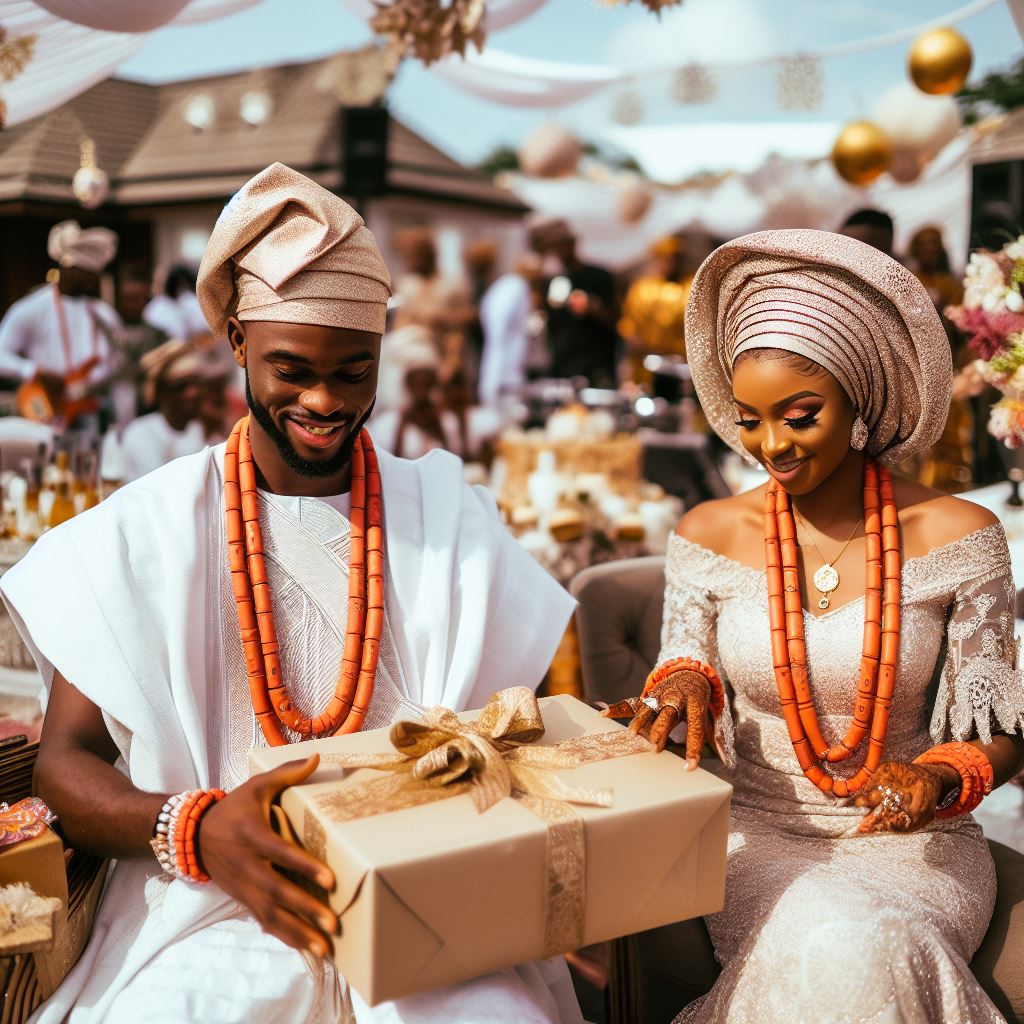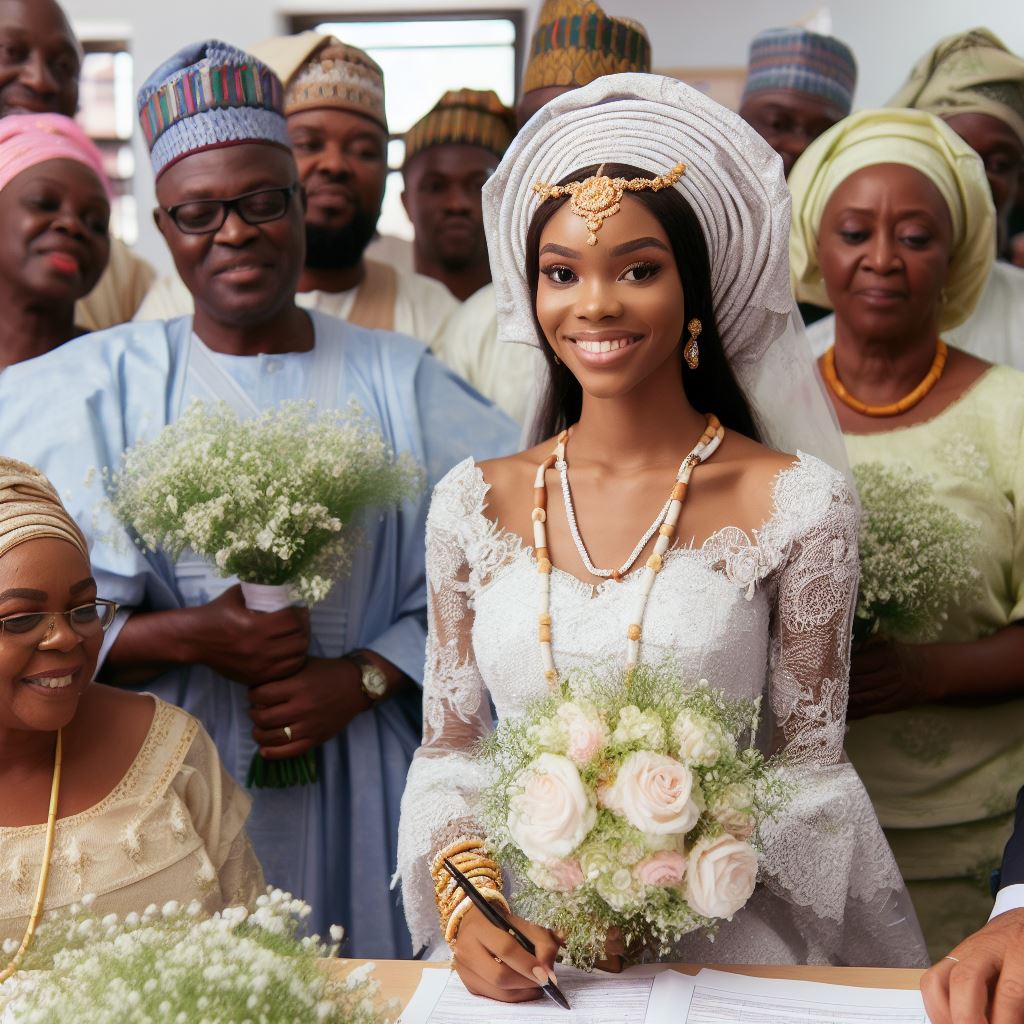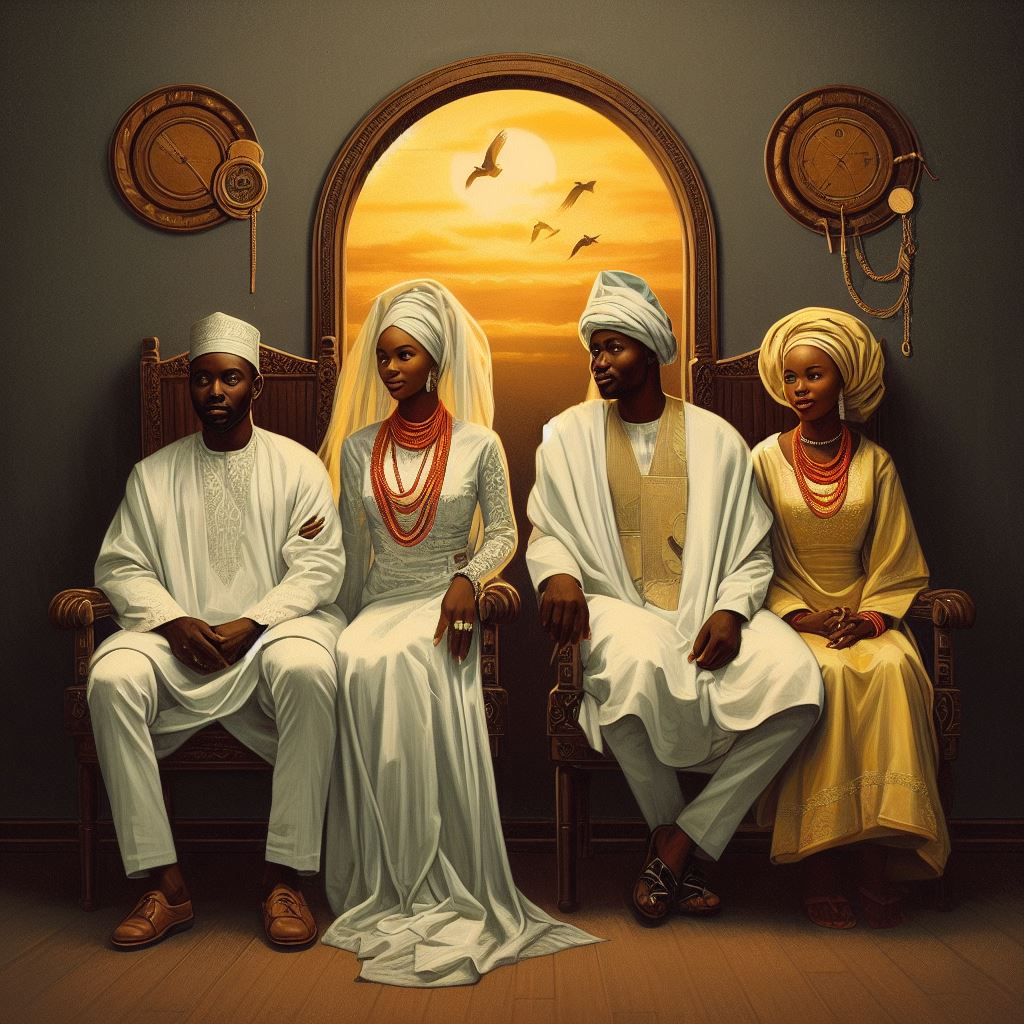Introduction
Courtship plays a significant role in shaping Nigeria’s traditional marriage definition.
Through courtship, couples in Nigeria establish a foundation for their future marriage, as it encompasses various customs and rituals.
This blog post will delve into the concept of courtship in Nigeria, explore its significance in shaping Nigeria’s traditional marriage definition, and highlight the influence of courtship on Nigeria’s perception of marriage.
Courtship in Nigeria is a process through which individuals, with the intention of marriage, get to know each other.
It involves a series of cultural practices, such as meeting the family, exchanging gifts, and observing traditional customs.
These practices lay the groundwork for a successful marriage and set the expectations for both partners.
The significance of courtship in shaping Nigeria’s traditional marriage definition cannot be overstated.
It serves as a platform for the couple to assess compatibility, build trust, and establish mutual understanding.
Courtship in Nigeria reflects the values, beliefs, and traditions that define marriage within the culture.
Thesis Statement: Courtship plays a crucial role in shaping Nigeria’s perception of marriage by providing a framework for selecting suitable partners, fostering cultural practices, and preserving traditional values.
Through courtship practices such as the introduction ceremony, traditional engagement, and dowry negotiations, Nigeria’s perception of marriage is influenced.
These customs and rituals encompassed within courtship facilitate the process of defining marriage in Nigeria and ensure the preservation of cultural heritage.
In the upcoming sections, we will explore the various aspects of courtship in Nigeria and analyze how they contribute to the definition and understanding of marriage within the Nigerian society.
By understanding the role of courtship, we gain insight into the cultural dynamics that shape Nigeria’s perception of marriage.
Historical Background
Historical roots of courtship in Nigeria
Courtship in Nigeria has deep historical roots, tracing back to ancient times.
It has always been an integral part of Nigerian culture, playing a significant role in shaping the country’s marriage definition.
Traditional customs and rituals involved in courtship
The traditional customs and rituals involved in courtship reflect the rich cultural heritage of Nigeria.
These customs vary across the different ethnic groups, but they all share common elements.
One of the most prominent customs in Nigerian courtship is the involvement of families in the process.
Families play a crucial role in selecting potential partners and facilitating the courtship process.
This ensures that the marriage aligns with the values and traditions of the community.
Another essential aspect of courtship in Nigeria is the exchange of gifts.
This practice serves as a demonstration of interest and commitment between the prospective bride and groom and their families.
Gifts can range from simple tokens to more significant offerings, depending on the socioeconomic status of the families involved.
Importance of courtship as a pre-marital stage in Nigerian culture
Courtship in Nigeria is not just a superficial display of affection; it holds great importance as a pre-marital stage.
This period allows the individuals to get to know each other, understand each other’s values, and build a strong foundation for their future marriage.
During courtship, couples engage in various activities together, such as visiting each other’s homes, going on chaperoned dates, and attending social events as a couple.
These activities offer opportunities for bonding, communication, and assessing compatibility.
Purpose of courtship in Nigerian culture
Potential for a successful marriage.
One fundamental purpose of courtship in Nigerian culture is to assess the potential for a successful marriage.
Compatibility in areas such as values, beliefs, family background, and life goals is thoroughly examined during this stage.
The families also play an essential role in assessing the suitability of the match.
Time to learn and acquire vital skills necessary for a successful marriage
Courtship is also seen as a time to learn and acquire vital skills necessary for a successful marriage.
Through guidance from family members and observing role models within the community, couples learn about marital responsibilities, communication skills, conflict resolution, and parenting.
Platform to establish trust, mutual respect, and understanding
Additionally, courtship serves as a platform to establish trust, mutual respect, and understanding between the partners.
This foundation is crucial for fostering a healthy and enduring relationship.
It is important to note that courtship in Nigeria is not entirely static.
It has evolved over time, influenced by factors such as globalization, urbanization, and the introduction of new cultural values.
However, despite these changes, courtship remains an essential and valued part of Nigerian culture.
Basically, courtship has deep cultural roots in Nigeria and serves as a pre-marital stage that holds immense significance.
The involvement of families, exchange of gifts, and activities undertaken during courtship all contribute to shaping the country’s marriage definition.
By providing a platform for compatibility assessment, skill acquisition, and relationship building, courtship plays a vital role in preparing couples for a successful and fulfilling marriage in Nigerian society.
Read: A Lifelong Bond: Inspirational Bible Verses on Marriage
Courtship Practices
Traditional Courtship Practices
- Nigerian courtship, deeply rooted in culture, embodies a blend of tradition and modernity.
- Traditional courtship involves an intricate dance of rituals, with regional variations.
- A commonality across regions is the significance of family and community in courtship.
- In Yoruba culture, ‘Ijoko’ is a matchmaking process initiated by elders, paving the way for courtship.
- Among the Igbo people, ‘Iku aka’ signifies the introduction of a suitor to the family.
- The Hausa-Fulani practice ‘Haki’ – a groom’s gift to the bride’s family – symbolizes respect and commitment.
Role of Parents and Family
- Parents and family members play a pivotal role in Nigerian courtship.
- They serve as intermediaries, assess compatibility, and offer guidance.
- Family approval is often a prerequisite before a couple can move forward.
- Elders’ blessings are considered essential for a harmonious marriage.
Stages of Courtship in Nigeria
- Introduction: Families arrange meetings, where the couple gets to know each other.
- Visiting Period: The potential spouses exchange visits, allowing further interaction.
- Negotiation: Families discuss terms, such as dowry and wedding arrangements.
- Gift Exchange: Exchange of gifts, symbolizing commitment and goodwill.
- Engagement: A formal announcement is made, signifying the impending union.
- Wedding Ceremony: The culmination of courtship – a celebration of love and unity.
In Nigeria, courtship is a vibrant tapestry of tradition and family values, woven into the fabric of modern relationships.
It’s a testament to the enduring influence of culture in shaping the country’s marriage definition.
Read: Navigating Marital Challenges: Guidance from the Bible
Influences on Courtship
- Cultural and religious influences shape courtship practices in Nigeria.
- The traditional Nigerian culture emphasizes the importance of family, respect, and traditional gender roles in courtship.
- Religion, particularly Christianity and Islam, plays a significant role in courtship, influencing values and expectations.
Evolution of Courtship Practices
- Courtship practices in Nigeria have evolved over time, influenced by modernization and globalization.
- Urbanization and exposure to modern ideas have brought changes to traditional courtship practices.
- Younger generations are embracing new ways of courtship, including online dating and social media platforms.
Impact of Western Ideas and Media
- Western ideas and media have significantly influenced Nigeria’s perception of courtship and marriage.
- The portrayal of relationships in Western movies and TV shows has shaped the expectations of Nigerian youths.
- Western ideas of romance and dating have clashed with traditional Nigerian courtship, leading to a blend of practices.
- Media platforms like Facebook and Instagram provide a platform for young Nigerians to explore alternative courtship methods.
Courtship in Nigeria is strongly influenced by cultural and religious traditions, but it has also evolved due to modernization, globalization, and Western media.
While traditional practices still hold significance, there is an increasing acceptance of modern courtship methods among the younger generation.
It is important to strike a balance between preserving cultural values and adapting to the changing dynamics of courtship.
As Nigeria continues to evolve, so too will its definition of courtship and marriage.
Read: The Role of Husbands & Wives: Exploring Ephesians 5

Expectations and Responsibilities
During courtship in Nigeria, individuals are expected to meet certain expectations and fulfill specific responsibilities.
1. Expectations Placed on Individuals
- Individuals are expected to demonstrate good morals, values, and behaviors.
- They are expected to show respect to their partner and their partner’s family.
- They are expected to be financially stable and capable of providing for a family.
- They are expected to be mentally and emotionally prepared for marriage.
- They are expected to abstain from premarital sex and maintain purity.
2. Importance of Character Assessment and Compatibility
Character assessment and compatibility play a significant role in Nigerian courtship.
- Character assessment involves observing a potential partner’s behavior, attitude, and values.
- It helps determine if the individuals share the same morals, goals, and principles.
- Compatibility ensures that the couple can forge a harmonious and fulfilling union.
- It contributes to the long-term success and happiness of the marriage.
3. Roles and Responsibilities During Courtship
Both partners in Nigerian courtship have specific roles and responsibilities to fulfill.
Responsibilities of the Man
- The man is expected to initiate the courtship process by expressing interest in the woman.
- He must prove that he is financially capable of taking care of the woman and potential family.
- He should demonstrate good character, respect, and proper etiquette towards the woman and her family.
- He should communicate openly and honestly, expressing his intentions and future plans.
- He must involve the woman’s family and seek their approval before proceeding further.
Responsibilities of the Woman
- The woman should be respectful and receptive to the man’s advances and intentions.
- She should assess the man’s character, background, and compatibility with her own values.
- She should communicate her expectations, desires, and concerns regarding the courtship.
- She must obtain consent and approval from her own family regarding the relationship.
- She plays a vital role in building a connection and fostering trust with her potential partner.
Generally, courtship in Nigeria carries significant expectations and responsibilities for individuals.
It emphasizes the importance of character assessment, compatibility, and fulfilling specific roles in the relationship.
Adhering to these expectations contributes to the successful and harmonious formation of marriages in Nigeria.
Read: God’s Plan for Marriage: Rooted in Biblical Scriptures
Effects on Marriage Definition
Courtship plays a significant role in shaping Nigeria’s understanding and definition of marriage.
It encompasses various cultural, social, and religious aspects that influence how individuals perceive and approach their marital relationships.
1. Shaping Nigeria’s Understanding and Definition of Marriage
Courtship serves as a crucial period for couples to get to know each other better, understand their values, and determine if they are compatible for marriage.
It allows them to build a foundation of trust, intimacy, and communication.
During courtship, couples engage in various activities such as spending time together, meeting each other’s families, and participating in traditional ceremonies.
These experiences help shape their understanding of the institution of marriage within the Nigerian context.
Nigeria’s diverse cultural landscape contributes to the different practices and expectations associated with courtship.
The rituals and traditions that couples participate in during courtship serve to reinforce the significance and importance of marriage in Nigerian society.
2. Influence on Determining the Suitability of a Potential Spouse
Courtship acts as a vetting process that enables individuals to assess the suitability of their potential spouse.
Nigerian society places great importance on factors such as social status, family background, and religious beliefs when considering a life partner.
Through courtship, individuals have the opportunity to gauge if their potential spouse aligns with the expectations set by their families and communities.
It provides them with a chance to evaluate their partner’s character traits, values, and goals for the future.
The influence of courtship goes beyond individual preferences.
It also involves the opinions and perspectives of the families involved, as they play a significant role in the decision-making process.
Courtship allows families to become acquainted, establish mutual respect, and determine if the union would be harmonious.
3. Establishment of Compatibility and Marital Expectations
Courtship helps establish compatibility and mutual understanding between couples.
It allows them to explore their similarities and differences, enabling them to make informed decisions about their compatibility for a lifelong commitment.
During courtship, individuals can discuss their expectations for marriage openly.
They can address various aspects such as gender roles, financial responsibilities, parenting styles, and cultural practices.
This open dialogue helps avoid potential conflicts and ensures that both partners are on the same page before entering into the commitment of marriage.
Courtship also provides a platform for couples to develop realistic expectations for their future together.
It allows them to identify potential challenges and develop strategies to overcome them.
This process contributes to a stronger foundation for the marriage, as couples have a clearer understanding of each other’s needs and aspirations.
Essentially, courtship plays a crucial role in shaping Nigeria’s definition of marriage.
It influences individuals’ understanding of this institution, determines the suitability of potential partners, and helps establish compatibility and marital expectations.
By going through courtship, couples have the opportunity to lay a solid foundation for a successful lifelong partnership.
Challenges and Changes
Challenges that Courtship Faces in Modern Nigerian Society
- Increased pressure to conform to Western dating norms in urban areas.
- Traditional values clash with modern expectations, causing confusion and conflict.
- High rate of divorce and failed relationships contributes to skepticism towards courtship.
Influence of Technology and Online Dating on Courtship Practices
- Online dating platforms have revolutionized the way Nigerians meet potential partners.
- Technology allows for a wider pool of potential partners but also increases the risk of deceit.
- The illusion of choice created by online dating can lead to unrealistic expectations and shallow connections.
Recent Changes or Adaptations in Courtship Rituals and Their Impact on Marriage Definition
- Delayed marriage due to career pursuits and desire for financial stability.
- More couples are cohabitating before marriage, challenging traditional views on premarital relationships.
- Western cultural influences, such as casual dating and premarital sex, are becoming more accepted.
The Impact of These Challenges and Changes on Nigeria’s Marriage Definition
- The definition of marriage is becoming more fluid, encompassing diverse relationship dynamics.
- Traditional arranged marriages are declining in favor of romantic love as a basis for marriage.
- Society is becoming more accepting of non-traditional marriages, such as interfaith or interracial unions.
Courtship in Nigeria is facing numerous challenges and undergoing significant changes.
Technology and online dating have reshaped the way Nigerians approach courtship, while urbanization and Western influences have led to shifts in traditional courtship rituals.
These changes, along with the challenges posed by divorce rates and conflicting values, are redefining the concept of marriage in Nigerian society.
As Nigeria continues to evolve culturally and socially, the role of courtship in shaping the country’s marriage definition will remain a dynamic and fascinating topic to explore.
Conclusion
Courtship plays a crucial role in shaping Nigeria’s marriage definition.
It is not simply a pre-marital phase but holds significant cultural significance in Nigerian society.
Courtship serves as a tool for individuals to understand and appreciate the values, traditions, and expectations associated with marriage.
It provides a platform for couples to build a strong foundation for their future together.
By participating in courtship, Nigerians gain a deeper understanding of their partners, their families, and their respective cultures.
It creates an opportunity for individuals to learn and adapt to each other’s beliefs, customs, and traditions.
The process of courtship enables Nigerians to explore compatibility, create bonds, and establish trust before committing to marriage.
It is through courtship that couples assess their compatibility, shared values, and long-term goals.
Moreover, courtship allows families to come together, share experiences, and discuss important matters related to marriage.
It provides a platform for families to evaluate the suitability of a potential match based on socio-economic backgrounds, education, and religious beliefs.
Understanding courtship is crucial in comprehending Nigeria’s perception of marriage.
It influences how Nigerians perceive marriage as a lifelong commitment and the importance they place on family and communal bonds.
Therefore, in order to truly understand Nigeria’s marriage definition, one must recognize the central role courtship plays in shaping this perception.
It serves as a bridge between individuals, families, and communities, fostering understanding, respect, and unity.




